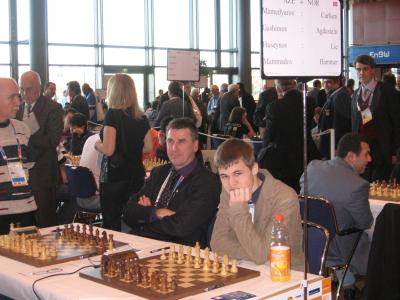(Note to my few regular readers: For certain reasons, this entry is written in my poor English instead of German, but this is an exception.)
Yesterday, IM Greg Shahade posted an
interesting article on how to reduce the huge amount of draws we're facing on all levels. He presents three ideas which I'll repeat here in short form:
- Whenever a game ends in a draw, the opponents will play another one with reversed colors, but continuing time control from the previous game. This goes on until there will be a decided game.
- Basically the same the previous one, but only for draws before move 40. Draws beyond that will stand.
- When presented a draw offer, a player has three options: Accept, reject, or switch sides and continue playing.
I'm definitely no fan of the first idea as in my point of view it changes the character of the game too much; although many players out there seem to think differently, the chess clock is
no integral part of the game of chess! If you look a bit deeper into the FIDE Laws of Chess, you will find that (at least for "regular" games) the board position generally matters more than the time control; take, for example, 6.11 a): "If both flags have fallen and it is impossible to establish which flag fell first then: the game shall continue if it happens in any period of the game except the last period". It's as if the clock doesn't even exist in this case!
Now for sure there will be these of you out there saying "Oh, this dinosaur. Just not willing to accept any change. Character of the game, blablabla..." Well, let me tell you this: Over the past years, a lot of sports have been playing around with their rules in order to attract media attention. For example, volleyball and fencing introduced "speed up" mechanisms: Do people still remember that in volleyball only the serving team was able to score? Or that in fencing there used to be a minimum two-point advantage rule like in Wimbledon?
Well, did these ideas work out? I don't really think so. And actually for me they even took the fun out of watching these sports - not that I ever spent a lot of time doing so (mostly during the Olympics), but the tension used to be somewhat higher. Just take the Wimbledon example - the
long matches are the really interesting ones, aren't they?
That's what I mean when I talk about changing the game's character. I welcome ideas for attracting media, but I'm not willing to give up the game's "soul" for that. And as far as I'm concerned, that's exactly what the given examples volleyball and fencing did by introducing the mentioned changes.
Now let's talk about the other two ideas. Solution 2 is a mild version of the first one, mainly targeting the
real bad habit of short (or "grandmaster") draws. I'd like to give it a try some time.
But the third idea seems
absolutely sexy. An experienced chess coach once told me: "When your opponent offers a draw, he (or she, a nod to Jen ;-)) is basically admitting he (or she) has no idea what to do." Or a quote by another one, a bit more to the point: "Whenever someone offers you a draw, your first thought should be: OK, why is my opponent thinking his (or her) position is worse?" I don't like draws by mutual agreement and do my best to avoid them (well, except for team matches if it secures the necessary half point for the win), but quite a couple of times I had to accept a rather surprising draw offer, because for some reason I had managed to reach an if not completely lost, but at least totally awful position. Usually these offers came from opponents rated somewhat lower than myself (still, I don't consider myself a really strong player).
Imagine their reactions in the post mortem when I presented them a not really difficult winning variation which I had already been calculating during the game. And now, imagine the learning effect for them if I had been able to apply this rule proposal! No one likes to admit it, but you can read as many books and work yourself through as many training videos as you want to, nothing leaves as deep an impression as an actual loss! And since we all want to learn (don't we?), this idea would not only encourage players with fighting spirit - and these are the ones the media love - no,
absolutely all players in the world would benefit from it.
Mr. Shahade doesn't mention what happens with the clocks in the proposed third scenario, but I'd actually feel uncomfortable if switching sides would include switching time controls around. I suppose (or at least hope) he silently assumes that each player will keep his own time, so in reality the players wouldn't really switch sides, but just turn around the board 180 degrees. This is a setup I'd actually enjoy. Mr Gijssen, if you're reading this, I think this would make a cool proposal for the next Rules and Tournament Regulations Commission meeting.


